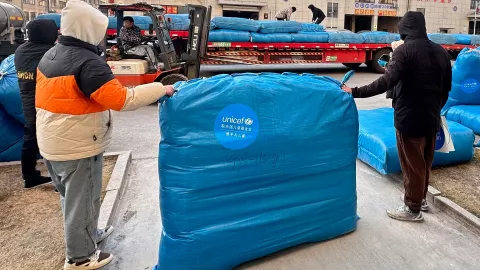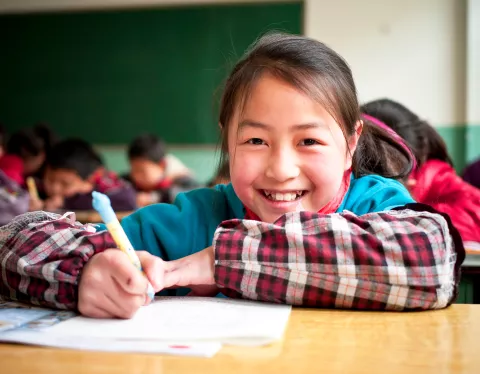Reaching out to Children and Women Affected by HIV/AIDS
Reaching out to Children and Women Affected by HIV/AIDS
- Available in:
- 中文
- English
Editor's Note: The following is a transcript of a discussion conducted with Mr. Wang Shuguang, Chengdu-based UNICEF programme consultant; Dr. Zeng Kai, programme officer with the Aba Prefecture Bureau of Disease Control; and Ms. Bai Feng, an officer with the Zhaojue County Department of Civil Affairs of Liangshan Prefecture.
Q: How has the earthquake affected the lives of children and women affected by HIV/AIDS?
Dr. Zeng: In Aba Prefecture, where Wenchuan County, the epicentre of the earthquake is located, people living with HIV lost their homes and belongings. The earthquake caused landslides and buried cultivated land, depriving many of their means of livelihood. Also, their life-saving medicines couldn't be retrieved from the rubble.
About twenty days after the earthquake, although the roads were badly damaged, we carried medicines and walked in the mountains for two or three hours to visit families affected by HIV/AIDS in remote villages. Later, UNICEF provided us with an SUV vehicle. I can say that since the disaster, between walking and driving, we have not missed a single patient.
Mr. Wang: Before the earthquake, we were able to keep contact with people living with HIV. But after the disaster, some of them could not be reached by phone. I noticed that they had migrated to other provinces after their homes were destroyed. In some relocation communities, HIV/AIDS is considered a "dirty disease." The residents are afraid that the patients might have a bad influence on the children and youth.
I am very concerned about whether the patients can receive timely treatment after relocating to other places. UNICEF and other UN agencies have jointly developed a response plan on "HIV/AIDS Prevention in Emergencies" and are now looking into the issue of migration.
Q: What do you think the children and women need most?
Dr. Zeng: I would say they are more afraid of discrimination than the virus. In my prefecture, there is an HIV-positive couple with a child. The family is poor and according to government policy, they are qualified to receive living allowances. But the procedure, although confidential, requires that they use their real names, which they refuse to give for fear that other people will know about their disease. They would rather live in poverty than face the discrimination that might arise by being identified as HIV-positive.
Ms. Bai: During my home visits, I saw children orphaned by AIDS living in very harsh conditions, who told me that they could only eat meat once every one or two months. One girl said that her biggest wish for the Yi ethnic New Year was to have a pig for the festival so that she could have meat like the other children. Also, in many villages, children affected by AIDS are ignored by their peers, who don't want to play with them. So apart from financial support, they also need psychological support to escape from the shadow of being "HIV/AIDS children."
Q: What are the Government of China and UNICEF doing to help?
Mr. Wang: We are now piloting community-based care and support programmes in nine earthquake affected project areas and disseminating key messages on HIV/AIDS prevention to children and youth, especially those living in remote ethnic villages. We are training key figures like tribal chieftains, village committee cadres, and religious leaders.
For example, in Maoxian County, we spoke with spiritual leaders of the Qiang ethnic group, who have agreed to advocate for HIV/AIDS prevention.
Ms. Bai: After the earthquake, we invited children affected by HIV/AIDS to celebrate Children's Day with other students in the county. They sang songs and learned how to protect themselves during earthquakes and emergencies. Last August, three of the children went to Beijing during the Olympics and attended the UNICEF-supported summer camp for children affected by HIV/AIDS. In November, they attended a sports meeting among primary schools and enjoyed the fun of running and skipping rope with other children. Also, we visit their homes often to learn about their needs.
Q: Have you noticed any changes in children as a result of interventions from the Government of China and UNICEF?
Ms. Bai: I found that the children became more optimistic and outgoing. One 11-year-old girl, Ayi (a pseudonym), lost her father to AIDS. Her mother got remarried to a man living in a distant place and rarely comes home to see her and her little brother. Living with her grandmother, the girl was quite silent and felt inferior because other children would not play with her.
Last August, she went to Beijing to attend the UNICEF-supported summer camp. We took the children to visit some universities. Ayi was quite impressed and told me that she would study hard so that one day she might be admitted to such a place.
The children told me that the happiest thing for them was sitting in the Olympic venue to watch a baseball game. Though they didn't know much about baseball, they felt so excited to feel the atmosphere with thousands of people. Although it was just eight days in Beijing, they received much love and care. After that, Ayi became happier and more devoted to her study. She is now a fourth grader and a good student.




